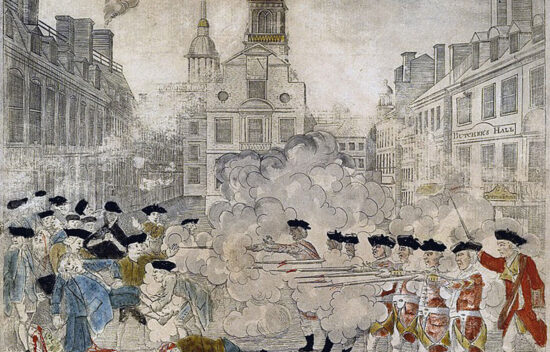Background Essay: Paths to Freedom
How did African Americans participate in the Revolutionary War? How did their actions reflect a desire to enjoy their natural rights?
Written by: The Bill of Rights Institute
The resistance against Great Britain and the Revolutionary War inspired American colonists to think about their natural and constitutional rights. The language and principles of liberty, equality, and self-governance led White and Black Americans to question the institution of slavery and to challenge it more directly. Their diverse efforts led to the largest emancipation in world history at that time and freed an estimated 100,000 enslaved people.
Some colonists acknowledged the moral wrong of slavery while protesting British violations of their rights in the 1760s and 1770s. Pamphleteer James Otis wrote that, “The Colonists are by the law of nature free born, as indeed all men are, white or black.” Pennsylvanian Benjamin Rush wrote, “It would be useless for us to denounce the servitude to which the Parliament of Great Britain wishes to reduce us, while we continue to keep our fellow creatures in slavery just because their color is different from ours.” While some colonists addressed the contradiction of slavery and freedom, Black Americans challenged the institution.
Enslaved persons appealed to revolutionary ideals to argue for their natural rights. In 1773, four enslaved persons in Massachusetts petitioned the legislature for their freedom “which, as men, we have a natural right to.” The following year, a group of enslaved men presented a freedom petition claiming their natural rights and right to consent. “We have in common with all other men a natural right to our freedom without being deprived of them by our fellow men.” The legislature did not yet act upon the petitions, but Black Americans continued to petition for their freedom during the war as did Nero Brewster and 19 other enslaved individuals in New Hampshire in 1779.
Once the Revolutionary War began in 1775 at Lexington and Concord, free and enslaved Blacks joined both the patriot and British sides. Several Black patriots fought bravely at the Battle of Bunker Hill alongside White soldiers, but General George Washington forbade their service in the Continental Army that fall. However, dire manpower needs caused Washington and Congress soon to reverse that policy. The differing states had varied recruiting policies during the war: only South Carolina and Georgia prevented all Blacks from serving.

Many Black Americans–both free and enslaved–fought on behalf of the Patriot cause. Pictured here is a Black Patriot soldier from the 1st Rhode Island Regiment.
DeVerger, Jean-Baptiste-Antoine. American Soldiers at the Siege of Yorktown. 1781. Drawing. Wikipedia. https://en.wikipedia.org/wiki/African_Americans_in_the_Revolutionary_War#/media/File:Soldier_in_the_Continental_Army_from_1st_Rhode_Island_Regiment.jpg
A total of 5,000 free and enslaved Blacks fought for the patriot side throughout the war. They fought in mostly integrated units, though some fought courageously in all-Black units such as the renowned First Rhode Island Regiment. Most of the enslaved African American soldiers were freed as a result of their service. During the war, many other enslaved persons simply walked off farms and did not return. At other times, enslaved veterans such as Felix Cuff resisted in his master’s attempt to re-enslave him and engaged in a shootout until the town of Waltham, Massachusetts declared him free.
The British consistently encouraged enslaved persons to escape to support the British war effort and disrupt the American cause rather than out of a sincere desire for Black freedom. In early 1775, Virginia royal governor, Lord Dunmore, threatened to “declare freedom to the slaves” before fleeing to British warships on the coast. By November 1775, Dunmore issued a proclamation promising freedom to any slave that fought for the British and formed the all-Black Ethiopian Regiment, whose members wore a sash with the motto, “Liberty to Slaves.” In 1779, British commander-in-chief, General Henry Clinton, issued the Philipsburg Proclamation offering freedom to all enslaved persons who simply fled to British lines. While the exact number of enslaved persons who ran to the British continues to be debated, more than 15,000 are estimated to have answered the offer in the proclamations.

Royal governor of Virginia Lord Dunmore released a proclamation that promised freedom to any slaves who would join the British cause. “Dunmore’s Proclamation” led to thousands of slaves escaping and fleeing to British lines.
Reynolds, Joshua. John Murray, 4th Earl of Dunmore. 1765. Painting. Wikipedia. https://en.wikipedia.org/wiki/John_Murray,_4th_Earl_of_Dunmore#/media/File:Sir_Joshua_Reynolds_-_John_Murray,_4th_Earl_of_Dunmore_-_Google_Art_Project.jpg
During the war, General Washington’s aides, John Laurens and his friend Alexander Hamilton, developed an emancipation plan. In 1779, Congress endorsed their plan to raise a contingent of 3,000 enslaved men in South Carolina and Georgia who would be granted their freedom in exchange for military service. The legislatures of those two southern states rejected the scheme because of their opposition to emancipation and to arming enslaved persons.
Whether they chose to support the patriots or the British, African Americans performed a wide variety of important roles. They served as soldiers, sailors, pilots, guides, spies, seamstresses, wagon drivers, and manual laborers for both sides throughout the war. Therefore, they made a significant contribution to both sides during the Revolutionary War.
Most importantly, thousands of enslaved persons liberated themselves from the barbarities and injustice of slavery in search of rights to liberty, equality, and consent. The act of self-liberation occurred throughout the colonies. In 1783, approximately 14,000 Blacks left with the British as they evacuated from New York and other major cities at the conclusion of the war. The freed people settled in Nova Scotia, Canada, England, Bermuda, the Caribbean, and Africa.
Tens of thousands of enslaved and free Black Americans challenged the institution of slavery in many ways during the Revolutionary War including running away, serving in the militaries of the belligerents, and petitioning for their freedom. Guided by the aspirational ideals of the American Revolution, they achieved their freedom but faced various forms of racial discrimination in the United States and abroad. In the new American republic, the movement for emancipation would continue to expand, while slavery would paradoxically grow and spread.



